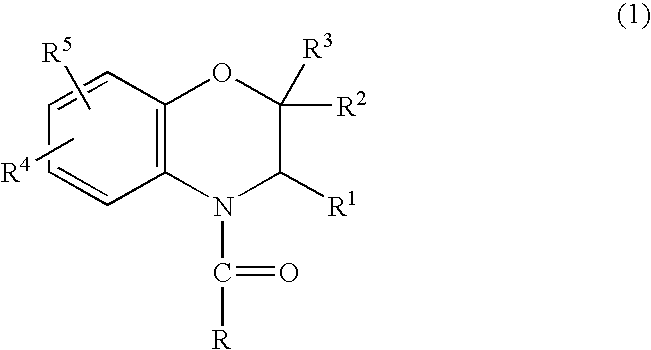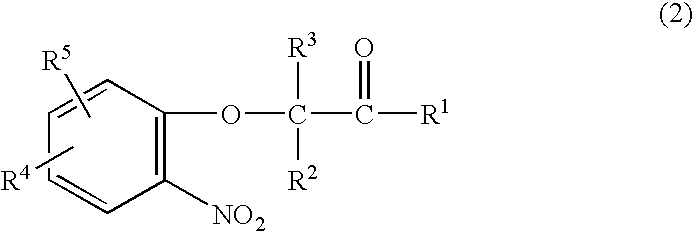Method for making acylamides by synthesizing and acylating benzoxazines
a technology of acylamide and benzoxazines, which is applied in the field of making acylamides, can solve the problems of excessive waste generation, and achieve the effects of reducing by-product formation, catalyst recovery, and improving o-nitrophenoxyketone feed ra
- Summary
- Abstract
- Description
- Claims
- Application Information
AI Technical Summary
Benefits of technology
Problems solved by technology
Method used
Image
Examples
example 1
o-nitrophenoxyacetone
[0029]The o-nitrophenoxyacetone is prepared by heating with agitation for five hours at about 65° C. a mixture which consists of 421.6 g (3.006 moles) of o-nitrophenol, 297.8 g (3.09 moles) of chloroacetone, 37.2 g (96%, 0.3615 moles) of sodium bromide, 277.2 g (3.3 moles) of sodium bicarbonate, 21.8 g (0.0647 moles) of aqueous tributylmethylammonium chloride (TBMAC), and 829 g of toluene. There is then added 9.0 g (0.093 mole) of additional chloroacetone to the mixture which is further heated at 65° C. for 2.5 hours (note, sample analysis indicated that the reaction was complete after 1.5 hours). There is then added, 570 g of water and the pH of the mixture is adjusted to 6.5–7 at 55° C. to 60° C. upon addition of 55 g of a 10% HCl solution. The phases are allowed to separate and the aqueous phase is removed.
[0030]There is added 600 g of a 5% NaCl solution to the organic phase and the resulting mixtures is vigorously agitated at 55° C. to 60° C. Upon separation...
example 2
3,4-dihydro-3-methyl-2H-1,4-benzoxazine (3-MBA)
[0031]A previously filtered mixture of 273.2 g (97%, 1.359 mole) of o-nitrophenoxyacetone, 178 g of toluene, and 44 g of isopropanol at 55–60° C. is added over a three hour period to a Parr reactor under 200 psig of hydrogen pressure and containing an agitated mixture of 85.5 g of a water wet 5% platinum on carbon catalyst (24.1 g on dry basis, Engelhart), 168 g of toluene, and 42 g of isopropanol at 55–60° C. During the addition, the hydrogen pressure and the temperature are maintained at 200 psig and 60° C., respectively. At the end of the addition, the conditions of the reactor are maintained for an additional 60 minutes.
[0032]The pressure of the Parr reactor is initially relieved and then is opened. The cooling coils and agitator shaft are washed with toluene / isopropanol; the warm slurry is filtered under 7 to 15 psig pressure. The catalyst is filtered and washed with 140 g of toluene / isopropanol and 280 of water. The resulting orga...
example 3
(±)-4-dichloroacetyl-3,4-dihydro-3-methyl-2H-1.4-benzoxazine (benoxacor)
a) o-Nitrophenoxyacetone (o-NPA)
[0033]The following materials are combined in a 1000 gallon vessel and heated at 65° C. for 6–8 hours: 499.0 kg (1.000 mole equiv.) of o-Nitrophenol (o-NP, 99%, 3.551 kg-moles), 359.7 kg (1.05 mole equiv.) of chloroacetone (CA, 96%, 3.733 kg-moles), 45.4 kg (0.124 mole equiv.) of sodium bromide (0.441 kg-moles), 328.9 kg (1.102 mole equiv.) of sodium bicarbonate (3.915 kg-moles), 27.2 kg (0.023 mole equiv.) of aqueous tributylmethylammonium chloride (TBMAC, 70%, 0.081 kg-moles), and 989 kg of toluene. The reaction is checked for completion and a trim charge of chloroacetone is added if necessary. Then 682 kg of water are added at 60° C. and the pH of the reaction mixture is adjusted to pH 6.5 –7.0 at 55 to 60° C. (about 66 kg of 10% HCl). The phases are separated and the heavier aqueous phase is removed. A 5–15% NaCl solution (725 kg) is added to the organic phase, the mixture is ...
PUM
| Property | Measurement | Unit |
|---|---|---|
| temperature | aaaaa | aaaaa |
| temperature | aaaaa | aaaaa |
| temperature | aaaaa | aaaaa |
Abstract
Description
Claims
Application Information
 Login to View More
Login to View More - R&D
- Intellectual Property
- Life Sciences
- Materials
- Tech Scout
- Unparalleled Data Quality
- Higher Quality Content
- 60% Fewer Hallucinations
Browse by: Latest US Patents, China's latest patents, Technical Efficacy Thesaurus, Application Domain, Technology Topic, Popular Technical Reports.
© 2025 PatSnap. All rights reserved.Legal|Privacy policy|Modern Slavery Act Transparency Statement|Sitemap|About US| Contact US: help@patsnap.com



